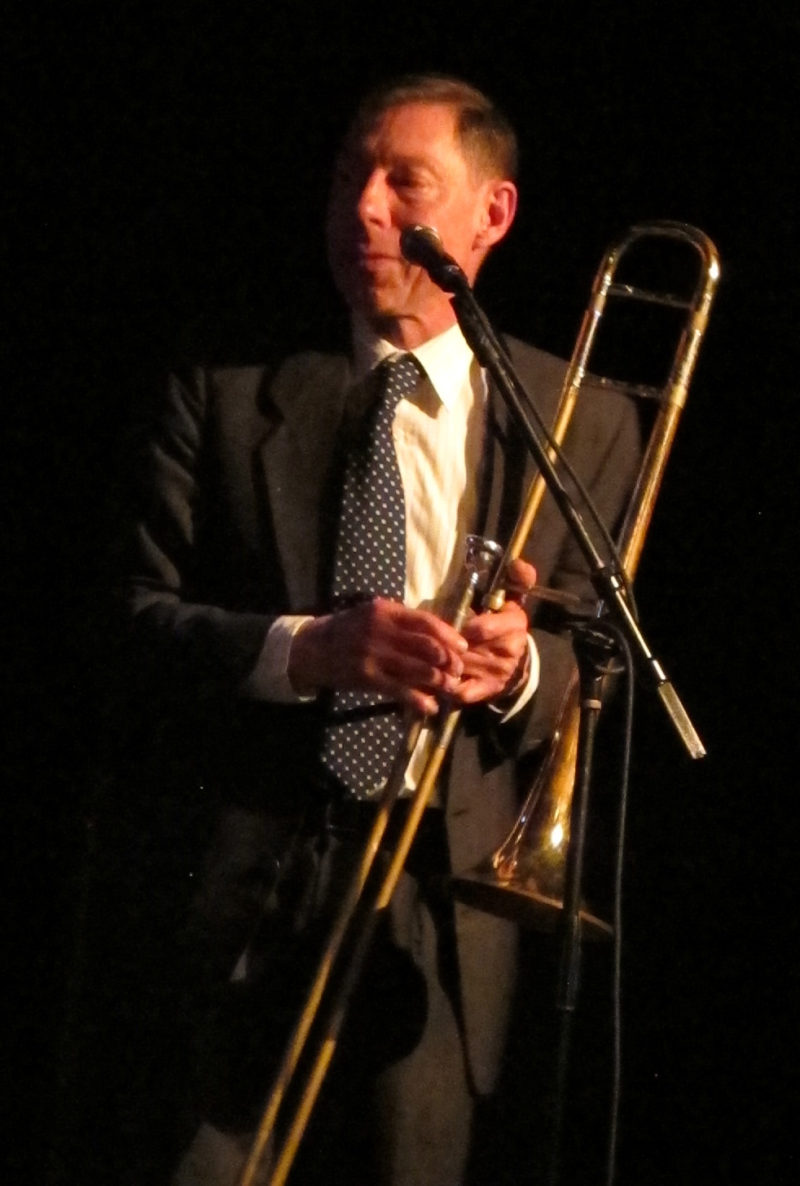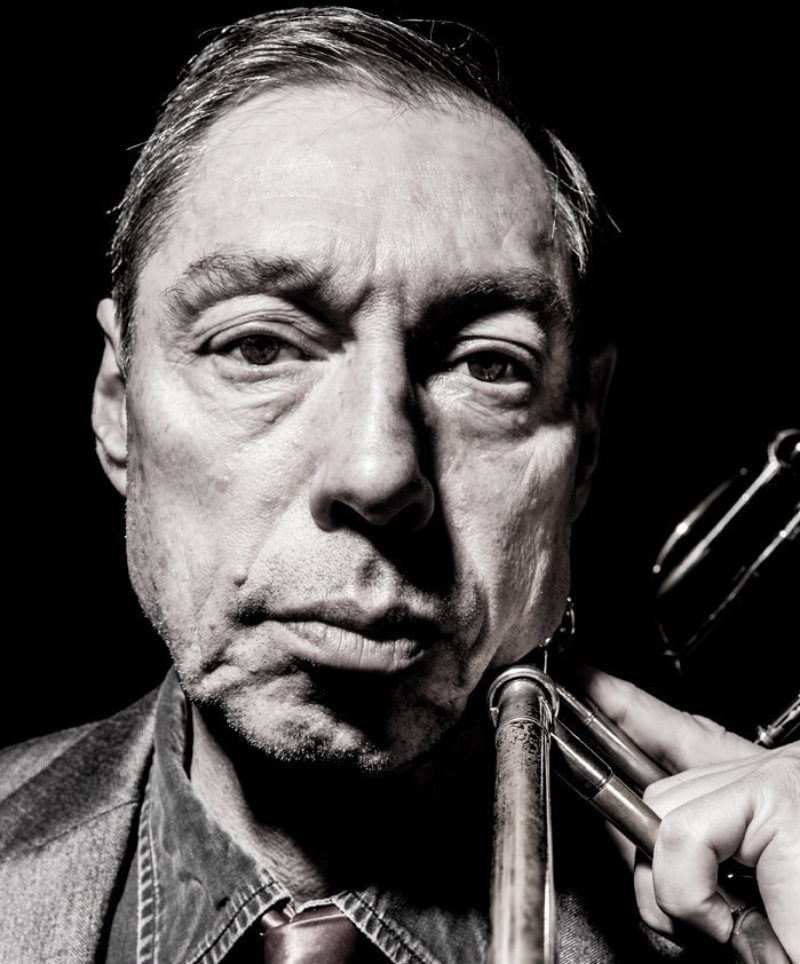Peter Zummo

The next step to the solo album Zummo with an X was logic, it also involves Arthur Russell and shares the atmosphere of some of Russell’s more intimate work. Song IV (trio) contained on this collection is an excellent example of the chemistry between Zummo, Russell and Mustafa Ahmed. Zummo’s later work is a progress from the compositions on Zummo with an X. His latest release is 2016’s Dress Code (Don’t Look At My Car) on the Optimo Music label run by JD Twitch.
Jelle Vanlerberghe
How do you work as a composer? Do you use scores, give instructions or ideas in advance? Are the musicians restricted or rather free?
Peter Zummo
Lately I’ve come to think of composition as pre-planning for the event. This can take any form, but it’s always more interesting than just improvising. I find my ideas in my daily workouts with the instrument, or while walking, or maybe I just hear something internally. I notate these ideas precisely in terms of pitch and rhythm, and date the sketch along with any other information. I resist the temptation to normalize any oddities, keeping the off-the-beat quality, for example, rather than adjusting to a more normal style of notation. I might give a page of these to musicians to read, but increasingly I’m working at further development of the ideas by analyzing the pitch set and extracting a mode, and thus writing a bass line or harmonic accompaniment.
The musicians are restricted by the information and instructions I present, and are therefore freer than they would be if they were just free to engage in their habits.
JV
Are there any main ideas or do you maintain a philosophy in your musicianship?
PZ
I try to keep the drama out of the music. Working the musical system will give you all the drama you seek. I try to keep it clean and to use devices such as bending notes, vibrato, and so on tastefully. I also get confused, and friends tell me that I’m hypercritical, but when I listen to casual recordings of performances, I find things that I want to change and improve at the next performance.
JV
On your records you’ve worked with musicians you’re well involved with. Is that a deliberate choice?
PZ
It makes sense to work with the people you know. There’s a communication. The musicians I have been involved with for a long time were people I met in various circumstances. Perhaps we were on a similar wavelength. Today, I can meet a person and know I can play or work with them without having heard them play. I can do this via email, etc.
JV
Your work is sometimes connected to dance or written for dance performances. Also you’re occupied with your presence — or even choreography — on stage. Can you elaborate on that?
PZ
In the 1970s I began working with dancers and choreographers. Often we worked in a loft space and I was the only musician, with one or several dancers. I felt that no rules of music applied, and I became aware of my presence in the space as having to do with more than just making sound. My work with LaMama and the Downtown Ensemble helped me to understand that a musician always has a theatrical presence. I worked at understanding and developing this skill.
When I reconnected with Roswell Rudd in the mid 1990s (my first lessons with him were in 1976, approximately) he mentioned that he had been working with a hotel band, backing vaudeville acts, in upstate New York, and that he had learned so much about showmanship. His performances then and later gave me a lot of ideas about how to act and work onstage. He also helped me to understand that rhythm comes from the ground (or floor of the stage), and that the necessary coordination within the body (in order to play the trombone) starts with the feet, and as a result I’ve pursued my own style of dancing as a means to get the music out using that ungainly instrument.
JV
What’s your view on the regained interest for minimalistic and experimental music (beyond Reich or Glass)?
PZ
Various experiences with this regained interest have led me to question whether those now interested have the context with which to understand the earlier (60s – 80s) performance practice. One can’t simply read the music. Often the composer has written extensive instructions to accompany the score (the page with the notes, or the obviously musical information). I’ve seen good musicians not paying enough attention to these instructions.
My conclusion is that there is no less content in minimalism, it’s just that one’s attention and intention is to be focused in a more narrowly defined area. There was an emphasis on the organization of the relationship of the people involved. Often the individual accepted severe restraints on how to perform, and the ensemble result had more of a communal nature. I think this is a less obvious path today.
JV
You studied a while with Roswell Rudd. Were these sessions inspiring for your art?
PZ
Roswell had developed pedagogy for teaching chromatic improvisation that had a more abstract basis than the then common system of working with scales and arpeggios through the different keys. His was based on learning to move from any note by any interval. This suited me, and when I had completed this part of the study his next step was to then learn the known melodies and extemporize on them. However, I used the preparation he gave me to go in a somewhat different direction.
In the later studies with Roswell, he gave me polyrhythmic exercises while suggesting an almost mystical relationship between understanding the standing wave and counting one, two, three, and four.
JV
How was collaborating with Arthur Russell and Mustafa Ahmed? Can I say you inspired each other or pushed each other in new territory?
PZ
Yes, of course. Notably, Arthur found different people around town that could make wonderful music. They came with very different backgrounds and (musical) educations. Putting these people together in ensembles made for a situation in which the social unit reflected the larger contemporary democracy. Other people were doing the same thing in different ways, and I had my own take on it.
Mustafa has a unique gift for shaping the form of the ongoing open form performance, while keeping it groovy. Arthur was always pushing me to develop my music by writing more and developing the found fragment. Much later, I’ve gone in this direction.
JV
You’ve been working in a lot of fields. Do you still discover new things? Do you see a kind of progress in your work yourself?
PZ
There is no end to the learning. Working for composers, choreographers, poets, and bands has taught me much, not only about my own performing, but also about their specialized work. Much of my understanding of and ability with composing has come from being a musician realizing the work of composers.
JV
What projects are you currently working on?
PZ
I’ve done music for a film called Second Spring, which will be released this year in London. In New York I’m now in rehearsal for a theatrical production with the Talking Band using five horn players and two actors. Foom Music are releasing a vinyl disc in March. The recording is of a rehearsal in 1984 with Arthur, Mustafa and Bill Ruyle.
JV
Are you keeping track of the New York scene nowadays, new voices that inspire you? In what way has it changed since you arrived?
PZ
There are so many more young artists in New York now, as compared to when I arrived in 1975. They rejuvenate the scene (if there is one) and I enjoy meeting and working with them. Doing so is how older artists stay young. Also there are many young curators and organizers who have a historical perspective and want to bring some of hidden past into the current conversation. One big change is that we have bike lanes now, and craft beer just about anywhere.
JV
Welcome to Brussels!
